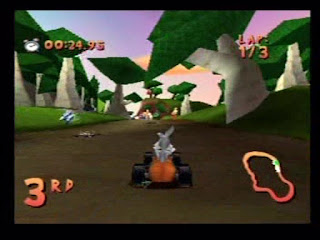This is probably one of the most underrated PlayStation One
games I ever played. Sure, it was essentially a rip-off of Crash Team Racing but its controls were slick and the animations
smooth – and what’s more, it had that added appeal of a vast array of playable Tunes characters, ranging from the
excessively popular, such as Bugs Bunny, to the downright obscure, such as the
Evil Scientist from Water, Water Every
Hare (1952).
It’s difficult to condense all of the game’s references into a single blogpost. They’re prolific, and range in subtlety. ‘Gossamer’s Castle’ and ‘Dungeon Disasters’ contain allusions to Hair-Raising Hare (1946) and Water, Water Every Hare, while the ‘Wascally Woods’ and ‘Forest Frolics’ tracks contain homages to the ever-understated Ralph Wolf and Sam Sheepdog shorts. Other references include, but are not limited to, Duck Dodgers in the 24½th Century (1952), Rocket Squad (1956), The Hasty Hare (1952), the Roadrunner shorts, Ali Baba Bunny (1957), Little Beau Pepé (1952), Hare-Way to the Stars (1958), Robin Hood Daffy (1958), Beanstalk Bunny (1955), and a couple of tracks based entirely around the Chuck Jones masterpiece What’s Opera, Doc? (1957).
This may seem impressive (and it is), but what’s more
impressive is the cast of characters at the player’s disposal, and their
quotes. The game begins with six characters – Bugs, Daffy, Marvin the Martian,
Lola Bunny, Taz and Wile E Coyote. But once the player starts to unlock bonus
characters, a huge cast of characters become playable – from Foghorn Leghorn to
Sylvester the Cat. To begin with, the voice acting is on point, but even better
is their many, many allusions to their character’s cartoons, of which there are
too many to record down here. Some quotes are taken directly from the most
obscure episodes that even the most hard-core Tunes fan would struggle to recount. For example, some of Porky’s
quotes come from Duck Dodgers… (1952)
and Porky Chops (1949), while some of
Sylvester’s are taken from A Street Cat
Named Sylvester (1953) and Cats and
Bruises (1965).
Aside from the many references to classic, Golden Age
cartoons, even more obscurely the character Smokey the Genie (from A-Lad-In His Lamp (1948)) features as
the race officiate, and later becomes a playable character. Precisely why they
decided on such an obscure one-shot character to act as host is unknown, and
frankly rather odd, but it’s all the same rather nice to see the resurrection
of a long-dormant, forgotten Looney Tunes
character, even if he wasn’t exactly sorely missed.
Perhaps most importantly, the gameplay is solid too. The Wacky Races PlayStation One game
released the same year had an equal amount of research go into its presentation
in terms of appealing to fans of the series, but lacked the smooth, compelling
gameplay to render it a ‘good’ game. This game, while pertaining primarily to
fans of the ‘40s and ‘50s shorts specifically, provides, in equal balance, a
sophisticated and appealing game with enough classic cartoon references to
appeal to the most substantial of Looney
Tunes fans. Indeed, as expected, Looney
Tunes Racing is fun, but also surprisingly detailed, consequently rendering
it a wholesome, if unoriginal, experience.
Image Source:
Looney Tunes Racing. [VG] (PS, 2000) Infogrames, Circus Freak.







No comments:
Post a Comment